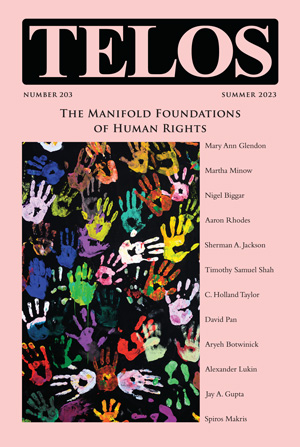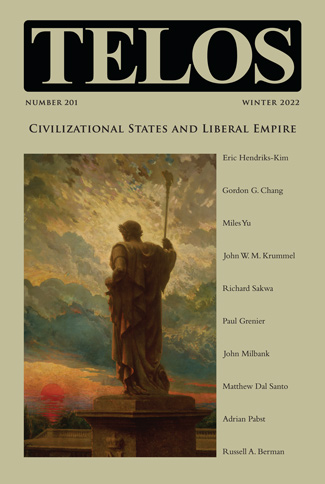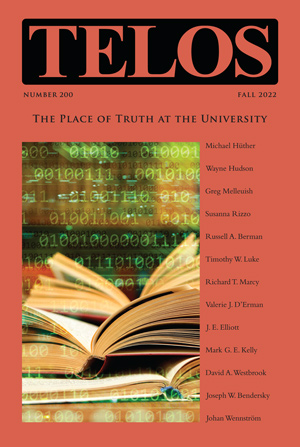By David Pan · Wednesday, July 26, 2023 Telos 203 (Summer 2023): The Manifold Foundations of Human Rights is now available for purchase in our store. Individual subscriptions to Telos are also available in both print and online formats.
 One of the most disappointing human rights debacles in the last few years was the withdrawal of U.S. forces from Afghanistan. For those who still take an interest, the human rights situation there has become horrendous, with Human Rights Watch documenting the denial of schooling and employment to women, extrajudicial killings, and torture. Moreover, in a severe rebuttal to those who supported the withdrawal, Taliban rule has created the conditions for a renewal of terrorist groups that can now develop and train in Afghanistan with impunity. There is also a good case to be made that the U.S. withdrawal there emboldened Putin to invade Ukraine, calculating that the United States and its allies no longer have the stomach for protracted conflicts in order to prevent human rights abuses. It may be that we have traded a low-grade conflict in Afghanistan for a high-intensity one in Ukraine. The lesson here is that the struggle for human rights, while beginning as a moral problem about our common responsibilities, can only be taken seriously when we consider its political ramifications. What do we owe to our fellow humans, and what sacrifices should we make in order to fulfill those responsibilities? One of the most disappointing human rights debacles in the last few years was the withdrawal of U.S. forces from Afghanistan. For those who still take an interest, the human rights situation there has become horrendous, with Human Rights Watch documenting the denial of schooling and employment to women, extrajudicial killings, and torture. Moreover, in a severe rebuttal to those who supported the withdrawal, Taliban rule has created the conditions for a renewal of terrorist groups that can now develop and train in Afghanistan with impunity. There is also a good case to be made that the U.S. withdrawal there emboldened Putin to invade Ukraine, calculating that the United States and its allies no longer have the stomach for protracted conflicts in order to prevent human rights abuses. It may be that we have traded a low-grade conflict in Afghanistan for a high-intensity one in Ukraine. The lesson here is that the struggle for human rights, while beginning as a moral problem about our common responsibilities, can only be taken seriously when we consider its political ramifications. What do we owe to our fellow humans, and what sacrifices should we make in order to fulfill those responsibilities?
Continue reading →
By David Pan · Wednesday, July 5, 2023 In spite of the divided opinions concerning the Supreme Court’s ruling against affirmative action in college admissions, there is still solace in realizing that there is an underlying consensus that racial discrimination has no place in U.S. society. The primary dispute is about the means of achieving a society without racism.
The majority opinion of the Court is that discriminating by race not only is unjust but reinforces the discrimination that it is meant to eliminate. Rather than overturning precedent, as the dissenters claim, the Court reaffirms the idea of the injustice of discrimination established in a series of Supreme Court judgments. Judge Roberts cites one such case that affirms: “‘Distinctions between citizens solely because of their ancestry are by their very nature odious to a free people whose institutions are founded upon the doctrine of equality.’ Rice v. Cayetano, 528 U. S. 495, 517 (2000) (quoting Hirabayashi v. United States, 320 U. S. 81, 100 (1943)). That principle cannot be overridden except in the most extraordinary case.” Evaluating people by their race is clearly contrary to the idea of equal treatment established in such previous cases, and the majority opinion uses this long-held principle as the guide for its judgment.
Continue reading →
By David Pan · Friday, February 24, 2023  On the anniversary of the Russian invasion of Ukraine, the continuing war indicates that the foundations of a rules-based global order are not just the rules themselves but also the structure of sovereignty that supports those rules. Sovereignty includes both the use of power and the establishment of a legitimating vision of order. The challenges to the Westphalian system of global order consequently come not just from the Russian invasion but also from the Russian idea of its civilizational mission against Western secularism as well as China’s idea of a “shared humanity for mankind.” Telos 201 provides analyses of both of these alternative visions for global order. Matthew Dal Santo, for example, describes Russia’s stance as a defense of a spiritual rather than a secular conception of the basis of order. Gordon Chang analyzes the way in which China has been promoting its tianxia model of unified global governance against the chaos and conflict of separate sovereign nation-states. The frame within which to view these alternative visions is not the struggle between spirituality and secularism or between China and the West, but the global development of nationalism. On the anniversary of the Russian invasion of Ukraine, the continuing war indicates that the foundations of a rules-based global order are not just the rules themselves but also the structure of sovereignty that supports those rules. Sovereignty includes both the use of power and the establishment of a legitimating vision of order. The challenges to the Westphalian system of global order consequently come not just from the Russian invasion but also from the Russian idea of its civilizational mission against Western secularism as well as China’s idea of a “shared humanity for mankind.” Telos 201 provides analyses of both of these alternative visions for global order. Matthew Dal Santo, for example, describes Russia’s stance as a defense of a spiritual rather than a secular conception of the basis of order. Gordon Chang analyzes the way in which China has been promoting its tianxia model of unified global governance against the chaos and conflict of separate sovereign nation-states. The frame within which to view these alternative visions is not the struggle between spirituality and secularism or between China and the West, but the global development of nationalism.
Continue reading →
By David Pan · Monday, January 16, 2023 Telos 201 (Winter 2022): Civilizational States and Liberal Empire is now available for purchase in our store. Individual subscriptions to Telos are also available in both print and online formats.
 In concluding that “All political action has then in itself a directedness towards knowledge of the good: of the good life, or of the good society,” Leo Strauss describes an essential link between power and values. Because the power to make decisions about our future cannot be separated from the fundamental goals and ultimate meaning of our lives, we cannot exercise power that would be divorced from some set of values. Even the narrowest understanding of self-interest must come to terms with one’s own mortality and the meaning of others for our own existence. Consequently, raw power does not exist, as it can only be exercised within some understanding of its purposes. In concluding that “All political action has then in itself a directedness towards knowledge of the good: of the good life, or of the good society,” Leo Strauss describes an essential link between power and values. Because the power to make decisions about our future cannot be separated from the fundamental goals and ultimate meaning of our lives, we cannot exercise power that would be divorced from some set of values. Even the narrowest understanding of self-interest must come to terms with one’s own mortality and the meaning of others for our own existence. Consequently, raw power does not exist, as it can only be exercised within some understanding of its purposes.
When we consider the way in which power functions on a global level, it will also be crucial to understand how a world order will reflect a particular way of structuring the relationship between values and power. Even the seemingly most egregious use of power can only take place within the framework of an attempt to realize values in the world, and realist accounts of global order must also recognize the importance of some ideology such as nationalism as a means of establishing political values. Accordingly, discussions of balance-of-power dynamics can only begin once great powers emerge as a consequence of the political will of certain peoples to understand themselves in a certain way. Based on such measures as GDP, population, and military spending, Russia does not rank particularly well in relation to countries such as Brazil and India, neither of which pretends to great power status. If Russia can be considered a great power today, it is primarily because of the goals and values that its government embodies. Values form the foundations of global order, and Russia only continues to project its power because it maintains a sense of the global reach of its values for determining order for others.
Continue reading →
By David Pan · Thursday, December 15, 2022  As the teaching assistant strike at the University of California extends into its fifth week, it seems that education has increasingly merged with activism. In fact, J. E. Elliott argues in our podcast interview that the development of the humanities in particular has moved so far in this direction that activism has become the explicit focus and attraction of majoring in the humanities for college students. As he lays out, such activist-oriented education is not a form of resistance but a result of the corporatization of the university, which involves not just links between corporations and universities but also the way in which college education has developed into a mass market commodity. The expansion of higher education, in promoting the admission of larger proportions of the population into college, has diluted the elite character of the college degree, making it into a more purely professional qualification and forcing colleges to devote more effort into justifying the value of their degrees for the job market. Because the ideals of inclusion and of merit are inherently contradictory, integrating more students into college has devalued the degree credential and therefore colleges must design their programs with an eye toward different segments of the higher education market. Consequently, the humanities at U.S. universities have evolved to establish “Brand English” to compete with “Brand STEM” and “Brand Business” by promoting social activism as its main distinguishing characteristic. As the teaching assistant strike at the University of California extends into its fifth week, it seems that education has increasingly merged with activism. In fact, J. E. Elliott argues in our podcast interview that the development of the humanities in particular has moved so far in this direction that activism has become the explicit focus and attraction of majoring in the humanities for college students. As he lays out, such activist-oriented education is not a form of resistance but a result of the corporatization of the university, which involves not just links between corporations and universities but also the way in which college education has developed into a mass market commodity. The expansion of higher education, in promoting the admission of larger proportions of the population into college, has diluted the elite character of the college degree, making it into a more purely professional qualification and forcing colleges to devote more effort into justifying the value of their degrees for the job market. Because the ideals of inclusion and of merit are inherently contradictory, integrating more students into college has devalued the degree credential and therefore colleges must design their programs with an eye toward different segments of the higher education market. Consequently, the humanities at U.S. universities have evolved to establish “Brand English” to compete with “Brand STEM” and “Brand Business” by promoting social activism as its main distinguishing characteristic.
Without the traditional literary and intellectual canons, the focus of humanities education has shifted toward promoting diversity, equity, and inclusion, which have become in many respects code words for identity politics, socialist-inspired redistribution, and college for all as entry into the job market. But because these three policies are partisan positions that have been enshrined as overarching truths (or in Elliott’s terms, “truth-posits”) for higher education, college humanities have to a large extent abandoned genuine debate about the origins and consequences of different ideas in favor of activist promotion of such ideas. The strike itself foregrounds the focus on equity without, however, considering the consequences of such a policy.
Continue reading →
By David Pan · Monday, November 28, 2022 Populism has now arrived in China. As opposed to the 1989 protests driven by students as well as an intra-government political struggle, the current unrest, while including students, has been driven much more clearly by a broader mass of people who have grown frustrated with the bureaucratic overreach of the zero COVID policy. With the largest and most comprehensive system of bureaucratically organized surveillance, management, and domination of the populace in the world, China has certainly been ripe for such populist revolt. While the original theory of the new class was developed by Milovan Djilas in order to explain state socialism in the Soviet Union, the populist reaction to the new class has up to now been associated mainly with liberal democracies whose state bureaucracies are still relatively undeveloped when compared to the Chinese version. The Chinese state receded somewhat during the reform and opening up period, but the rule of Xi Jinping, the growth of the surveillance state, and especially the zero COVID policy have led to new extremes in the level of new class management of the population. Moreover, the lockdowns and their economic effects have highlighted the divide between the new class and the broader populace. As one protester shouted to the police, the police are state functionaries with stable incomes while most of the people are dependent on the flourishing of a market economy that has been throttled by the COVID lockdowns.
Continue reading →
|
|
 One of the most disappointing human rights debacles in the last few years was the withdrawal of U.S. forces from Afghanistan. For those who still take an interest, the human rights situation there has become horrendous, with Human Rights Watch documenting the denial of schooling and employment to women, extrajudicial killings, and torture. Moreover, in a severe rebuttal to those who supported the withdrawal, Taliban rule has created the conditions for a renewal of terrorist groups that can now develop and train in Afghanistan with impunity. There is also a good case to be made that the U.S. withdrawal there emboldened Putin to invade Ukraine, calculating that the United States and its allies no longer have the stomach for protracted conflicts in order to prevent human rights abuses. It may be that we have traded a low-grade conflict in Afghanistan for a high-intensity one in Ukraine. The lesson here is that the struggle for human rights, while beginning as a moral problem about our common responsibilities, can only be taken seriously when we consider its political ramifications. What do we owe to our fellow humans, and what sacrifices should we make in order to fulfill those responsibilities?
One of the most disappointing human rights debacles in the last few years was the withdrawal of U.S. forces from Afghanistan. For those who still take an interest, the human rights situation there has become horrendous, with Human Rights Watch documenting the denial of schooling and employment to women, extrajudicial killings, and torture. Moreover, in a severe rebuttal to those who supported the withdrawal, Taliban rule has created the conditions for a renewal of terrorist groups that can now develop and train in Afghanistan with impunity. There is also a good case to be made that the U.S. withdrawal there emboldened Putin to invade Ukraine, calculating that the United States and its allies no longer have the stomach for protracted conflicts in order to prevent human rights abuses. It may be that we have traded a low-grade conflict in Afghanistan for a high-intensity one in Ukraine. The lesson here is that the struggle for human rights, while beginning as a moral problem about our common responsibilities, can only be taken seriously when we consider its political ramifications. What do we owe to our fellow humans, and what sacrifices should we make in order to fulfill those responsibilities? 



